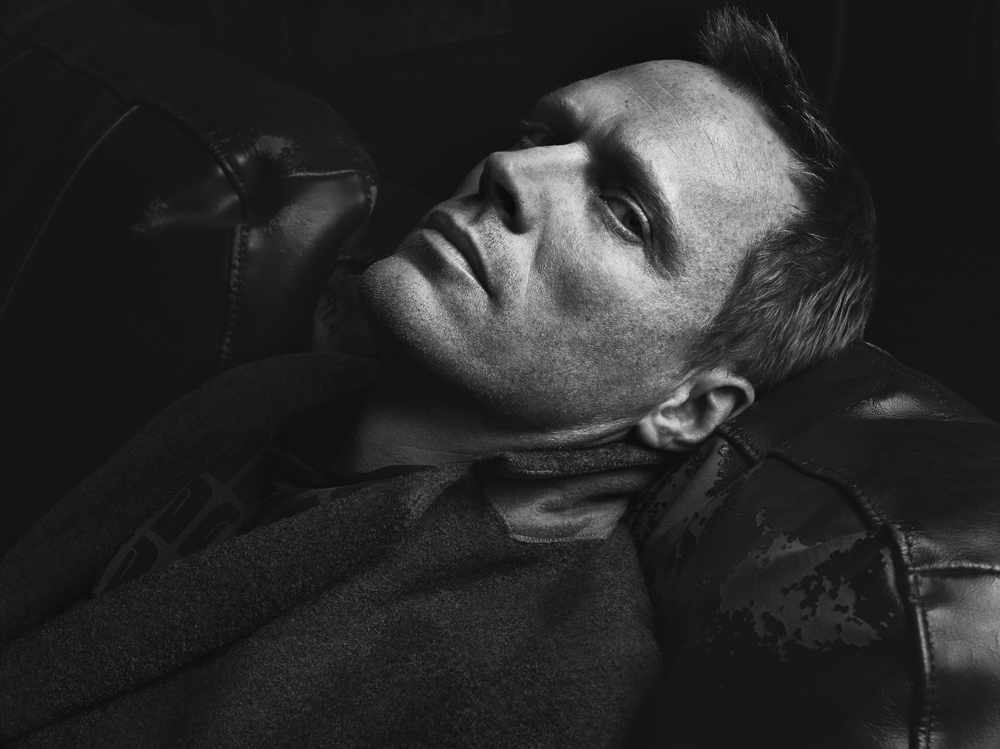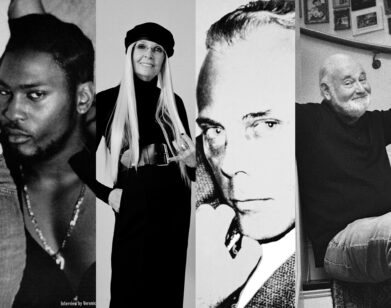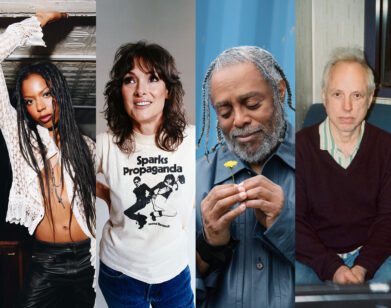Paul Bettany
PAUL BETTANY AT LE BARRICOU IN BROOKLYN, NEW YORK, NOVEMBER 2015. PHOTOS: RAF STAHELIN/ LALALAND ARTISTS. STYLING: MARINA MUNOZ/LALALAND ARTISTS. GROOMING: LAURA DELEON FOR CHANEL/JOE MANAGEMENT USING SOLUTION 10 DE CHANEL. STYLING ASSISTANT: ANITA LAU.
“I didn’t set out to make a film about homelessness, I set out to try to make a film about judgment,” says Paul Bettany of his directorial and authorial debut Shelter. Starring Bettany’s wife Jennifer Connelly and his Avengers co-star Anthony Mackie as Hannah and Tahir, a heroin addict and illegal immigrant trying to survive on the streets of New York, respectively, Shelter is both brutal and extremely compassionate. Bettany doesn’t sanitize the vulnerabilities of homelessness; he knows his facts and had his script vetted by Coalition for the Homeless. His characters have plenty of flaws—some more abhorrent than others—and yet it is hard not to feel for them. And if you can feel empathy for such characters, what does that mean about our notion of justice and the value of punishment?
“I present you with two pretty unforgivable characters: a woman who’s abandoned her child—the worst thing archetype-ly that you can be as a woman—and a man who was a terrorist,” Bettany explains. “Through spending time with them, you love them because people are all forgivable, we’re all innocents, we’re all worthy of forgiveness. They are two people in huge need of forgiveness and they find it in each other.”
Now 44, Bettany began his career in the late ’90s after graduating from the Drama Centre in London. His roles as a charming, vice-susceptible Geoffrey Chaucer in A Knight’s Tale and as mathematician John Nash’s delusion in A Beautiful Mind brought him international fame. His performances in independent films like Lars Von Trier’s Dogville and, more recently, J.C. Chandor‘s Margin Call cemented his relevance as a serious actor. His participation in Marvel’s Iron Man and The Avengers—first as just the disembodied voice of Jarvis and now as the physically-present The Vision—ensured that no producer can tell him his career is over (as one once did in the late 2000s).
But with Bettany, you get the sense that the Marvel attention is a (generally) pleasant bonus. He has a pretty grounded grasp on fame, explaining that he and Connelly try to keep things low-key, and takes compliments humbly (when praised for his performance in Margin Call, he responds, “I was pleased, I wasn’t ashamed of myself.”)
“When you’re doing well, it’s the truth of all things. [But] when you’re at your hottest, you’re becoming cold already,” he tells us. “I’ve noticed in the ebbs and flows of success and popularity, so much of it is fraudulent and to be distrusted. When one is doing really well, one’s jokes are also much funnier.”
EMMA BROWN: At what point did Jennifer become involved in the film? Did you always have her in mind?
PAUL BETTANY: I always had her in mind. One thing I noticed about making my first film, if you’re trying to make a film about a Nigerian Muslim immigrant and a homeless street junkie, no one wants to give you much money. It helps if you have a movie star in it and I happened to have one lying around at home. She was always going to be the girl in it.
BROWN: Did you talk to her about it while you were writing?
BETTANY: No, I didn’t. I’ve made that mistake before of sending her scenes and giving her scenes to read. I think you need to read these things in the full context of the script. So I wrote it and she read and then she said yes.
BROWN: You’ve talked about wanting to give Jennifer and Anthony room to act. What do you mean by that?
BETTANY: In the old days when I first was coming up, you would turn up on set in the morning with your coffee, script, and hangover and you would figure out what you were going to do with the day and how you were going to play the scenes. You would rehearse and then invite the crew in to watch the actors go through the scenes. The actors would go away to makeup and costume and the director and the DP would work out how they were going to cover what the actors had just done. Nowadays, that is often different. I come down as an actor and my marks are already laid out on the floor—somebody else organized what I’m going to do. I think, why am I here? And why I’m here is to express the words with some sort of vague emotion and make them seem real. I wanted to go back to how it was before.
I do feel that scripts get developed now to a point where they’re sort of actor-proof. If the actor is not very good, the narrative still survives because it’s all in the dialogue. Not to say there aren’t great performances in English-language films, because there are every year, but the 1970s were awash with great performances, and I was wondering whether it had to do with the amount of space and the amount of responsibility given to the actors. Films like Five Easy Pieces just don’t work unless Jack Nicholson shows up and is brilliant. Actors can be many things—vain, venal, self-serving, obnoxious, bullies—but all of the good ones are great storytellers. I wanted to watch what my actors were doing and how they were telling the story. I was genuinely interested in what version of the story they wanted to tell. Often they would do something that I wasn’t expecting and I would sit with myself and think, “Does my story survive this interpretation?” If it did, I would choose it. If it didn’t, we would sit down and talk and work it out together.
BROWN: When did you start to notice this shift in the way films are made?
BETTANY: It’s incremental. You’ll still work with some directors where that doesn’t happen, and sometimes it’s out of necessity because you’re in a really complicated, choreographed fight scene and the whole thing is being prevised in a computer, so it’s been decided months before, but I think that’s sneaking into the way action scenes are shot.
BROWN: You’ve said that your intention was to write a story that was ultimately uplifting. Do you think the film fulfills that?
BETTANY: We all have different thresholds for sentimentality. For me, it’s a hard won happy ending. The story, on one level, is about a man who’s a ghost walking around New York City—he’s damned because he’s done so many bad things—and he meets a girl who thinks she’s a ghost, but she’s not; she has something to live for. He needs to put one thing right on Earth before he can be with his family, and that one thing is getting her home to hers. For me, she’s going home to her child.
BROWN: Do you think there is a different attitude towards homelessness in London versus New York?
BETTANY: No, I don’t. I think they’re suffering from the same sort of issues: Rent getting higher, wages staying the same, the slashing of social housing, or public housing as they call it in America because they don’t like to use the word “social” in front of anything. In New York City, there’s been a cut of 32 percent of social housing in the last 10 to 15 years. There are now 60,000 homeless people staying in shelters every night, 24,000 of which are children. And that’s going on in a town that’s home to the most billionaires on Earth. There’s a similar situation going on in London. Loads of empty properties and yet… I don’t know how it works in England—if there’s the right to legal counsel at housing court—but in New York City, there certainly isn’t. If you’re a family about to be evicted you’re 80 percent less likely to be evicted if you have legal counsel. Legal counsel would cost the city $12,500 a year and the average stay for a homeless family is $45,000 in the shelters. It’s not only morally the right thing to do, but fiscally the wisest thing to do seems to be to provide legal counsel for families facing eviction.
BROWN: Do you think you’re a pretty empathetic person?
BETTANY: Yes, he said rather full of himself. I’ve got lots of weak suits, but I think you have to be if you’re an actor. Trying to be a good actor has to be involved with placing yourself imaginatively in different people’s circumstances. If you’re actively engaged in trying to be a good actor, you’re placing yourself imaginatively in different people’s positions.
BROWN: I know you decided you wanted to become an actor in your late teens. When did you first think about directing?
BETTANY: I have no idea. I’ve always been thinking about directing. I’ve always been interested in what other people are doing when I’m on sets. I’m interested in watching how my makeup is done when someone’s doing my makeup. I remember coming on my first set and it being a playground of things I wanted to ask questions about: cameras and lenses and what the lenses do, what’s the focus puller doing and how does that work? Why is there less margin for error when there’s less light? I was always asking questions and watching directors closely. I really like telling stories. When I was a kid, I wanted to write songs. In quite a fundamental, gratifying, childish way, I enjoy the doing of telling a story.
BROWN: Was there a moment when you actively decided, “I’m going to sit down and do this,” or did you just start writing?
BETTANY: A little bit of both. I was always waiting for the secret to be handed down to me. Ron Howard asked me what I was waiting for and I went, “Ron, I’m waiting to know the secret. I keep feeling there’s some sort of secret that’s going to passed on from a director.” He went, “Oh no. There is none. You’ve just got to on and do it and make mistakes and figure it out.”
BROWN: That’s the secret then. He gave it to you.
BETTANY: Yeah, the secret is that there is no secret. There’s getting on with it and occasionally happy accidents will happen that make it look like you know what you’re doing.
BROWN: When did you learn to play the guitar?
BETTANY: I was very young. I think around 13. I wanted to be a guitar player and write songs, but I hated singing my songs in front of other people, which is obviously a bit of a stumbling block to a major rock career. I sort went to my default place, which was acting.
BROWN: Do you still write songs?
BETTANY: No, I used to when I was a young actor, but when I became a father acting sort of took the place of what I did in my free time and my children became the main focus. I play a lot and my children play. Both my sons—my daughter’s still too young really—have surpassed me with their music skills, which is wildly irritating.
SHELTER COMES OUT TOMORROW, NOVEMBER 13, IN SELECT THEATERS.







